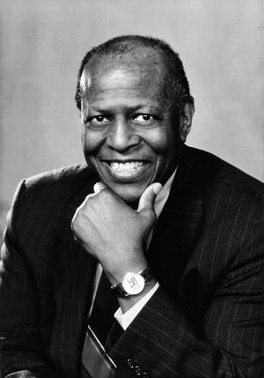Charles V. Willie facts for kids
Quick facts for kids
Charles V. Willie
|
|
|---|---|
 |
|
| Born | October 8, 1927 |
| Died | January 11, 2022 (aged 94) |
| Alma mater | Morehouse College Atlanta University Syracuse University |
| Occupation | Professor |
| Spouse(s) | Mary Sue Willie |
| Children | 3 |
| Scientific career | |
| Institutions | Syracuse University State University of New York Upstate Medical University Harvard University |
| Thesis | Socio-economic and ethnic areas of Syracuse, New York. (1957) |
Charles Vert Willie (October 8, 1927 – January 11, 2022) was an important American sociologist. He was a professor at Harvard University. He studied big social issues like desegregation (making schools fair for all students). He also researched higher education, public health, and how different races get along. Willie saw himself as a "sociologist" who used his studies to help solve real-world problems.
Contents
About Charles V. Willie
Charles V. Willie was born on October 8, 1927, in Dallas, Texas. His grandfather, Louis Willie, had been a slave. His father, also named Louis Willie, worked as a pullman porter, helping passengers on trains.
His mother, Carrie Sykes, was one of the first Black women in Texas to earn a college degree. However, because she was married, she was not allowed to teach in the segregated Dallas school system. So, she taught her children at home. They later rode in the back of streetcars to attend their segregated schools.
Education and Family Life
Willie went to Morehouse College and earned his bachelor's degree in 1948. He was even class president there. He then received his master's degree from Atlanta University in 1949. In 1957, he earned his Ph.D. in sociology from Syracuse University. He was a member of the Alpha Phi Alpha fraternity.
For many years, he lived in Concord, Massachusetts with his wife, Mary Sue Willie. They had three children. His children grew up to have careers in government, construction, and teaching at universities. Charles Willie passed away at his home in Brighton on January 11, 2022, when he was 94 years old.
Willie's Career and Work
In 1950, Charles Willie became the first African-American professor to earn a permanent teaching position at Syracuse University. He taught there until 1974. From 1962 to 1964, he worked for President John F. Kennedy. He was the Research Director for a program in Washington, D.C., that aimed to prevent youth crime.
Willie invited his college friend, Martin Luther King Jr., to speak at Syracuse University in 1961 and again in 1965. In 1974, he left Syracuse University to become a professor at Harvard University's Graduate School of Education.
Helping Communities and Schools
In 1977, President Jimmy Carter chose Willie to be part of the President's Commission on Mental Health. This group worked to improve mental health care in the country.
Willie also helped with many important school desegregation cases. He worked as an expert to help cities like Boston and Cambridge create plans to make their schools fair for all students. One famous plan he helped create was called "Controlled Choice." This plan was used in Boston for 10 years and in Cambridge for 20 years. He also helped with desegregation planning in many other cities across the United States.
Supporting Women's Rights
Willie was a member of the Episcopal Church. He was the first African-American to be elected Vice-President of the House of Deputies in the church in 1970. In 1974, he gave a sermon at a special service where the first eleven women were ordained as priests in his church. At the time, some church leaders did not agree with women becoming priests.
When the church leaders decided to cancel these ordinations, Willie resigned from his position in protest. He did this to show his support for women's equal rights. Because of his brave actions, Ms. magazine honored him as a "male hero" in 1982. He was recognized for standing up for women.
Awards and Special Honors
Charles Willie received many awards for his important work. In 2004, the American Sociological Association gave him the William Foote Whyte Distinguished Career Award. The next year, he received the W. E. B. DuBois Career of Distinguished Scholarship Award. He also received the Eastern Sociological Society Merit Award in 2006.
Many colleges and universities gave him honorary doctoral degrees. These included Syracuse University, Haverford College, and Harvard University. In 2000, Syracuse University gave him its highest alumni honor, the George Arents Pioneer Medal.
To honor his work, the Eastern Sociological Society created an annual award in his name in 2013. This award helps minority graduate students who show great promise in their studies. In 2021, Harvard University's Graduate School of Education also named a special fellowship after him, called the Dr. Charles Willie Fellowship. This helps students with financial support for their doctoral studies.
 | Percy Lavon Julian |
 | Katherine Johnson |
 | George Washington Carver |
 | Annie Easley |

